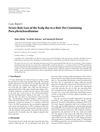Telogen Effluvium: Acute and Chronic Hair Loss Conditions
January 1997
in “
Dermatology
”
telogen effluvium acute telogen effluvium chronic telogen effluvium trichodynia telogen follicles terminal/vellus-like hair ratio androgenetic alopecia emotional stress dieting drug intake chronic diseases wash test corticosteroids chloroquine minoxidil TE AGA stress diet drugs diseases hair wash test steroids chloroquine Rogaine

TLDR Telogen effluvium is a hair loss condition with acute cases resolving quickly and chronic cases potentially lasting longer, sometimes requiring treatment.
The 1997 document describes telogen effluvium (TE), a hair loss condition that can be acute or chronic, affecting individuals of any age and sex. Acute TE is a sudden hair loss episode lasting 2-3 months, often triggered by stress or illness, with hair typically regrowing completely. Chronic TE, however, can last for months or years and may not resolve spontaneously, with about 30% of cases experiencing trichodynia. It is histologically characterized by an increased number of telogen follicles and a higher terminal/vellus-like hair ratio than androgenetic alopecia (AGA). Chronic TE may be caused by factors such as emotional stress, dieting, drug intake, and chronic diseases, and it sometimes co-occurs with AGA. Diagnosis involves measuring hair loss, with the wash test being a reliable method. While acute TE usually doesn't require treatment, chronic TE management may include reassurance, stopping any causative drugs, or addressing any underlying systemic conditions. Treatments like corticosteroids and chloroquine are mentioned, but the effectiveness of minoxidil is uncertain. The paper highlights the need to differentiate chronic TE from AGA for proper clinical management.







